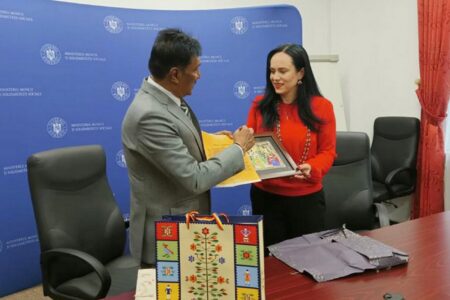Kathmandu. A labor agreement has been signed between Nepal and the European country Romania. The MoU was signed today by the Minister of Labour, Employment and Social Security Sharatsingh Bhandari and the Minister of Labor of Romania Simona Bucura Aprescu at the Ministry of Labor in Romania.
Romania is known as an attractive and safe labor destination for Nepali workers. After 55 years of diplomatic relations between Nepal and Romania, a labor agreement was signed between the two countries.
The two countries have agreed to resolve and manage issues such as dual contracts, basic English language knowledge and professional skills through mutual coordination and cooperation. Danduraj Ghimir, the spokesperson of the Ministry of Labour, Employment and Social Security, informed RASS that migrant workers from both countries will be able to enjoy social security like Romanian citizens, and that they are committed to effective implementation of the bilateral labor agreement through coordination and cooperation between the labor-related agencies of both sides.
Secretary of the Ministry of Labor Kewal Prasad Bhandari, Ambassador of Nepal to Germany Ramkaji Khadka and unpaid consul of Nepal in Romania Navraj Pokharel and high officials of various agencies related to labor of the Romanian government participated in the signing ceremony, said spokesperson Ghimire.
In the bilateral talks that took place before that, Labor Minister Bhandari presented Nepal’s concept about issues related to Nepalese workers, the need and impact of bilateral labor agreements. Romania’s Minister of Labor, Simona, expressed her commitment to ensure the protection of the rights and interests of Nepali workers and said that there is a significant demand for Nepali workers in her country and she is eager to coordinate and cooperate in the process of selecting workers transparently and bringing workers in a short period of time.
Romania has informed that it wants to establish its embassy in Nepal soon. It will be easy to verify the demand of migrant workers and issue entry permit. In addition to identifying potential skilled labor market for Nepali workers in Romania, there was a conversation about mutual cooperation by prioritizing the work of promoting safe foreign employment targeting women workers as well.
There is a large demand for migrant workers in Romania, 15,590 Nepali workers are employed there. In view of Nepali’s work nature, honesty and diligence, employers there have been providing opportunities in agriculture, construction and service sectors.

